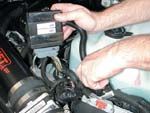
What Is It?: Thanks to the highly evolved electronic engine management systems installed by the factory on modern musclecars, we've got showroom stockers with 13-second capability, clean tailpipe emissions, and fuel economy we used to only dream about. Even better news is that the high-performance aftermarket offers reprogrammed computer modules that flush out those few compromises Detroit stuck us with for even better punch when you mash the gas pedal. Hot computer chips are here to stay, and Jet Performance Products is a leader in this high-tech field.
Features & Benefits: Unlike traditional grease-monkey bolt-ons, a hot-chip install can be done in a suit and tie-just watch that serpentine belt. The Jet Power Control Module (PCM) is an inline module that accelerates the ignition advance curve to begin the charge burn sooner for increased cylinder pressure, boosts automatic transmission hydraulic line pressure for faster and firmer upshifts, and increases fuel-injector duty cycles for richer air/fuel mixtures. Roll it all together and you're going to get from point A to point B faster. And it all comes without running afoul of smog laws, as every Jet product is approved by the California Air Resources Board (CARB) and is thus 50-state emissions legal.
Other Applications: Jet Performance sells PCM units for '96-'03 GM cars and trucks, '91-'03 Chrysler cars and trucks, and '88-'03 Ford cars and trucks. Also, for a fee, Jet can upgrade the calibrations of its modules post-sale to maximize subsequent additions like stroker kits, blowers, and nitrous oxide.
Installation Overview: To measure the typical gains afforded by plug-and-play electronic performance enhancers, we installed a Jet PCM (PN 19520-S) on a 17,000-mile '95 Impala SS. You've gotta love it when the whole deal takes less than 15 minutes, including the time it takes to open and close the hood.
Quick Test: Before the module installation, we baseline tested the Imp on Jet's Mustang chassis dyno and recorded 212 hp at 5,000 rpm. After modification, the rear tires registered 230 hp at 5,000 rpm, an 18-horse improvement. The ignition advance curve indicated that spark initiation occurred an additional 8 degrees BTDC versus stock, but there was no sign of preignition. Of course, you'd better run 89 octane gasoline (or better) to pull this off without rattling the slugs in their bores. On the road, car owner Bryant Sellers says full-throttle upshifts now chirp the skins, and WOT downshifts into passing gear make the rear end squat as engine torque rolls the body to starboard.
Total Price: The list price for our Impala SS module is $309, but Jet says the "street price" is around $250.